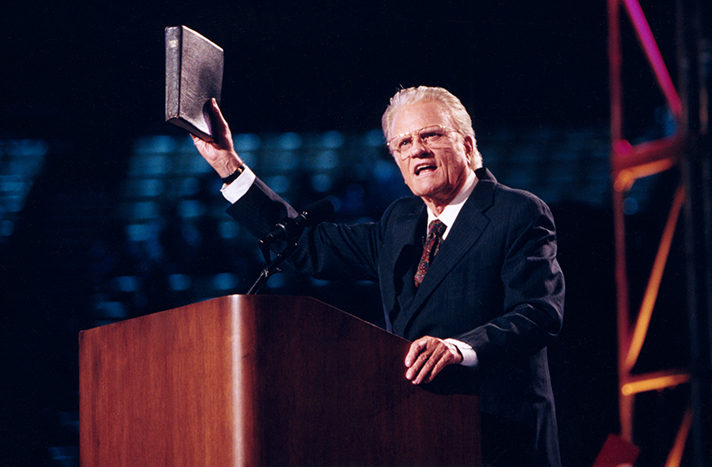
[Decision Magazine] – God is at work through the Holy Spirit when the Gospel is proclaimed faithfully. We, therefore, are to trust Him to accomplish His purposes in the hearts of those who hear the Gospel.
The Holy Spirit is the great Communicator. Without His supernatural work, there would be no such thing as conversion. Satan puts a veil over the truth, and this can be penetrated only by the power of the Holy Spirit.
It is this Third Person of the Trinity who takes the message and communicates with power to the hearts and minds of men and women. He breaks down the barriers. He convicts of sin. He applies the truth of the Gospel we proclaim. No evangelist can have God’s touch on his ministry until he realizes this reality and preaches in the power of the Holy Spirit. We, as proclaimers of the Gospel, must understand that the natural man cannot accept the truth of Christ. The things of God are foolishness to him. He cannot understand them because they are spiritually discerned (1 Corinthians 2:14).
That is why Jesus said, “When He [the Spirit] has come, He will convict the world of sin, and of righteousness, and of judgment” (John 16:8). We can—and must—preach the Gospel, but in the final analysis it is the Spirit who interprets the Word to the hearer and quickens it. We cannot manipulate His sovereign work; and once we understand that the results are in God’s hands, it will give us freedom from anxiety and fear of failure. Jesus told Nicodemus, “Unless one is born of water and the Spirit, he cannot enter the kingdom of God. … The wind blows where it wishes, and you hear the sound of it, but cannot tell where it comes from and where it goes. So is everyone who is born of the Spirit” (John 3:5,8). Yes, there is a mystery to the working of the Spirit—but we know that God alone can turn sinners from their sin and bring them to everlasting life.
Again, Jesus explained, “It is the Spirit who gives life; the flesh profits nothing. The words that I speak to you are spirit, and they are life” (John 6:63).
The filling of the Spirit was a prerequisite for power in the ministry of the first evangelists (Acts 1:8). Their Spirit-filled witness began in Jerusalem, then spread to Judea and Samaria, and on to the ends of the earth.
The Spirit’s filling does not “guarantee” the results we would like to see. Peter’s preaching at Pentecost resulted in 3,000 who “gladly received his word” and “were baptized” (Acts 2:41). Peter was equally filled with the Holy Spirit (Acts 4:8) when he later preached to a more select group. No converts are recorded here—only antagonism, bewilderment and persecution.
We need to be filled with the Holy Spirit—but what exactly does that mean? Some define it in terms of certain experiences or feelings. But the New Testament stresses that when we are filled with the Spirit we are controlled by the Spirit.
The Apostle Paul illustrated this when he commanded, “Do not be drunk with wine, in which is dissipation; but be filled with the Spirit” (Ephesians 5:18). Instead of being controlled by the wine of the world, we are to be controlled by the Spirit of God. Instead of devil intoxication, it must be divine intoxication. The verb is the present passive imperative—which implies a yieldedness to the Holy Spirit’s control. As we yield, so He fills; as He fills, so He controls. This may be a quiet, unemotional reality—in fact, at times we may not even be conscious of it.
But when we are filled with the Holy Spirit, we renounce our dependence on ourselves and our own strength, and we yield ourselves to His control. As we commit our lives to the Lordship of Jesus Christ each day, the Spirit of God fills us and empowers us for the work God has for us.
The Spirit-filled life is the normal Christian life. It enables the evangelist to speak the Word of God with boldness. When the early Christians received threats that might have diminished their boldness, they had special prayer for a fresh in-filling. God granted their request and, once again, they “spoke the word of God with boldness” (Acts 4:31).
My wife, Ruth, often reminded me that I should always preach from an “overflow.” I know what she meant. To be so filled with Scripture and so filled with the Holy Spirit that day or night I can give a reason for the hope that is within me, or give a Bible exposition, or give an evangelistic sermon (John 7:38-39, 1 Peter 3:15).
This Spirit-filled life was not an option for the early church; neither is it an extra for today. It is essential. The Holy Spirit’s ministry is an indispensable requirement to enable people to be “born of the Spirit.”
There is another reason for us to know the fullness and control of the Holy Spirit. We will encounter supernatural opposition. Beyond human opposition to our work, we can expect spiritual forces of evil (Ephesians 6:12). The “prince of the power of the air … now works in the sons of disobedience” (Ephesians 2:2).
That’s why we cannot convert anyone. We cannot match the power of Satan, but we do have authority over him when we call on the power of God’s indwelling Spirit. The supernatural opposition we face is also one reason why one of the most important aspects of evangelism is prayer.
In his letter to the Ephesians, Paul clearly indicated that the evangelistic ministry is a fight, not a frolic. And he realized the need of supportive prayer by God’s people. Paul sought intercessors, prayer partners, among the Ephesian Christians who would pray in the Spirit on all occasions with all kinds of prayers and requests. “Praying … for me,” he continued, “that utterance may be given unto me, that I may open my mouth boldly to make known the mystery of the gospel”
(Ephesians 6:18-19).
The apostles certainly understood the Holy Spirit to be the Third Person of the Godhead—not an ethereal influence but a Person, who is an essential part of evangelism. Their evangelistic task would have been impossible without His indwelling and control.
Finally, the servant of God knows when he is not spiritually prepared to proclaim the Gospel because he has grieved the Holy Spirit by committing sin (Ephesians 4:30). Maybe bitterness has crept into his life, or envy of Christians who seem to have greater blessing. It could be jealousy concerning another evangelist who appears to be more successful. Or anger. Or unkindness. His prayer life may have suffered and his Bible reading may have been neglected.
Even when that which is wrong is confessed and forgiven and cleansed (1 John 1:9), we may be called to walk by faith, not by feeling, as we minister. Some of our most effective service may be accomplished without a consciousness of having been successful and effective. God rewards the faith we place in the power of the Spirit to use Scripture and to bless the witness of even the weakest vessel. His Word will not return empty but will accomplish that which He desires and achieve the purpose for which He sends it (Isaiah 55:11).
Constantly, and in all humility, we need to remind ourselves that “unless the Lord builds the house, they labor in vain who build it” (Psalm 127:1).
Is your life controlled by the Spirit of God? Or has some sin crept into your life and clogged the channels of His blessing? Turn to Christ for cleansing, and yield your life without reserve to His Lordship. Then in constant dependence upon the Holy Spirit, let Him use you for His glory to touch other lives for Christ.
Article First Published Here

